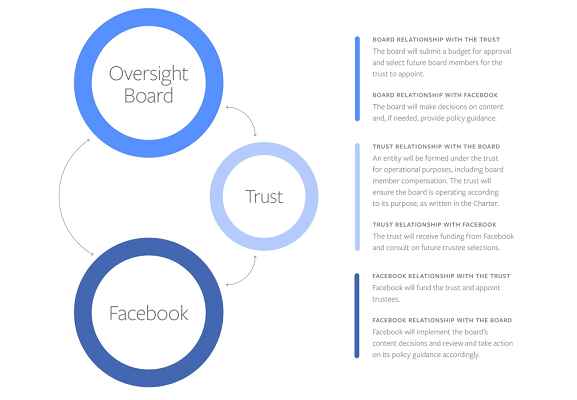Facebook has revealed a board of 40 people who will come up with the rules to govern controversial content on the social network, with powers to overrule even CEO and founder Mark Zuckerberg himself.
Zuckerberg says the “board’s decision will be binding, even if I or anyone at Facebook disagrees with it”.
The firm said the board would have ‘the discretion to choose which requests it will review and decide upon’
The “supreme court” – a new 40-person independent board will make the final decision on controversial questions about the social network’s content.
Users unhappy with the way their content has been treated on the platform will be able to take their case to the board after they have “exhausted” Facebook’s internal appeals process.
It is not clear when the oversight board will start work. Once it has, Facebook said it would implement its decision promptly, unless doing so could violate the law.
Mark Zuckerberg says the board will be completely independent – even of him. It also promised to treat the decision as a broader precedent for action – as long as it was “technically and operationally feasible” to do so.
With the focus on Facebook’s decisions over content only likely to grow more intense as elections loom in the UK and US, the members of the oversight board will be powerful and highly scrutinised figures.
The tech giant has started recruiting the “no less than 11 members” that will comprise the board.
In a conference call with journalists, it explained it was looking for people accustomed to making decisions “under a set of standards or policies”, saying they could include former lawyers, judges and “maybe even former journalists”.
“The board’s decision will be binding, even if I or anyone at Facebook disagrees with it,” Zuckerberg said in a statement.
“As an independent organisation, we hope it gives people confidence that their views will be heard, and that Facebook doesn’t have the ultimate power over their expression.”
In a document laying out the reasoning behind the new rules, Facebook revealed that some of the people it had consulted about the oversight board “recommended that membership be left to a fully democratic vote by Facebook users”.
Facebook rejected that idea, saying it would instead recruit a group of co-chairs who would “jointly select candidates for the remainder of the board seats”.
Facebook said the board would consider around a dozen cases a year, taking on the “most important” decisions that “are of greatest public benefit”.

